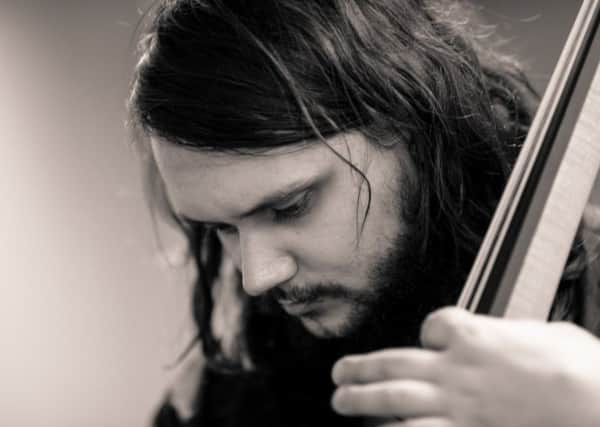Interview: Calum Gourlay on new solo album


There is a number by Duke Ellington, Solitude, which Calum Gourlay plays on his debut solo album with warm-toned economy of style. As a bassist, habitually heard within the thunderous ranks of the Scottish National Jazz Orchestra as well as numerous smaller outfits, it is, he agrees, quite a departure to stand up before an audience armed with just his double bass.
“The weirdest thing about it is setting up on your own – taking your bass on to the stage, setting it down and waiting to play it,” the 28-year-old player tells me. “You’re so used to playing with other people and having a chat with them before you go on and as you all set up.
Advertisement
Hide Ad“I found, though, that once I started playing, I just got right into it. I’d prepared a lot, practised a lot – probably more than I’ve practised for anything in my life.
“The best thing about playing solo,” he adds, “is that if the music isn’t going well, you can change it instantly, which you can’t do in a band. On your own, you’re your own master.”
Now the London-based Scot – most recently heard north of the Border touring with the trumpeter Colin Steele’s revivified quintet – has released that rarity, a solo double bass album, Live at the Ridgeway, which he recorded at his home before an invited audience, many of them fellow musicians.
Mince pies were apparently served, although any munching, one hastens to add, is inaudible in the recording, as Gourlay puts his considered stamp on established tunes by the likes of Ornette Coleman, Charlie Haden and Thelonious Monk, as well as some less expected excursions.
He eschews any use of effects pedals or other electronics which solo bassists such as Arild Andersen or Eberhard Weber sometimes favour, although he doesn’t necessarily rule out their use in the future. “I just haven’t felt the need for it yet. I just wanted to see if I could do it on my own, acoustically.”
Opening with his sonorous ruminations on Ornette Coleman’s Ramblin’, Gourlay moves on through the solemn Zen chiming of Haden’s Chairman Mao and bounces through the first of two numbers by Monk, Rhythm-a-Ning. He has a cheeky stab at Cole Porter in the rangy What Is This Thing Called Life? while his own Hendrix evokes the growls and tortured harmonics of the eponymous guitar hero, without quite breaking into The Star Spangled Banner, before leading on to a cover of Joni Mitchell’s Both Sides Now, an old folk standard one doesn’t readily expect to hear on solo bass.
Advertisement
Hide Ad“I’ve always really liked Joni,” Gourlay says. “When I pick repertoire, it doesn’t take me long to figure out if it’s going to work on solo bass or not. So I took the Joni tune and played around with it and it started to work straight away.”
He made the album for the new Two Rivers label launched by the Anglo-Iraqi musician Alya Marquardt. Having recorded it at his home in Golders Green, a house long associated with jazz musicians (not least Dave Smith’s Outhouse), he launched it at a lively gig at London’s Vortex. “Great fun,” he reports. “I played for longer than I’d ever played before.”
Advertisement
Hide AdA family contingent from Scotland occupied the first few rows, he says, including his father, John, a retired music teacher who composes contemporary music for Kirkcaldy Orchestral Society – and for his bassist son. “He wrote a piece for me and the Fife Youth Orchestra a few years ago, called Labyrinth, which had quite a bit of improvising for me in it.”
Gourlay Jr hopes to play some solo bass gigs in Scotland over the summer. He’s already booked for Glasgow Jazz Festival in a duo spot with the singer-harpist Cevanne Horrocks-Hopayian. Next month sees him back with the SNJO for their Sinatra tour with American vocalist Kurt Elling, while June sees him fly out to Denver, Colorado, as one of ten finalists in the prestigious ISB Double Bass Performance Competition.
In the meantime, double basses and much else will be sounding out globally to mark the Unesco Day of Jazz on 30 April, established “to highlight jazz and its diplomatic role of uniting people in all corners of the globe”. This year’s host city is Paris, but Glasgow Royal Concert Hall will hold events from midday onwards, including performances by school jazz bands plus an evening event featuring Brass Jaw, Fraser Fifield and Graeme Stephen and Ken Matheson’s Classic Jazz Orchestra
• For more, see www.jazzday.com and www.tworiversrecords.org
FOLLOW US
SCOTSMAN TABLET AND MOBILE APPS